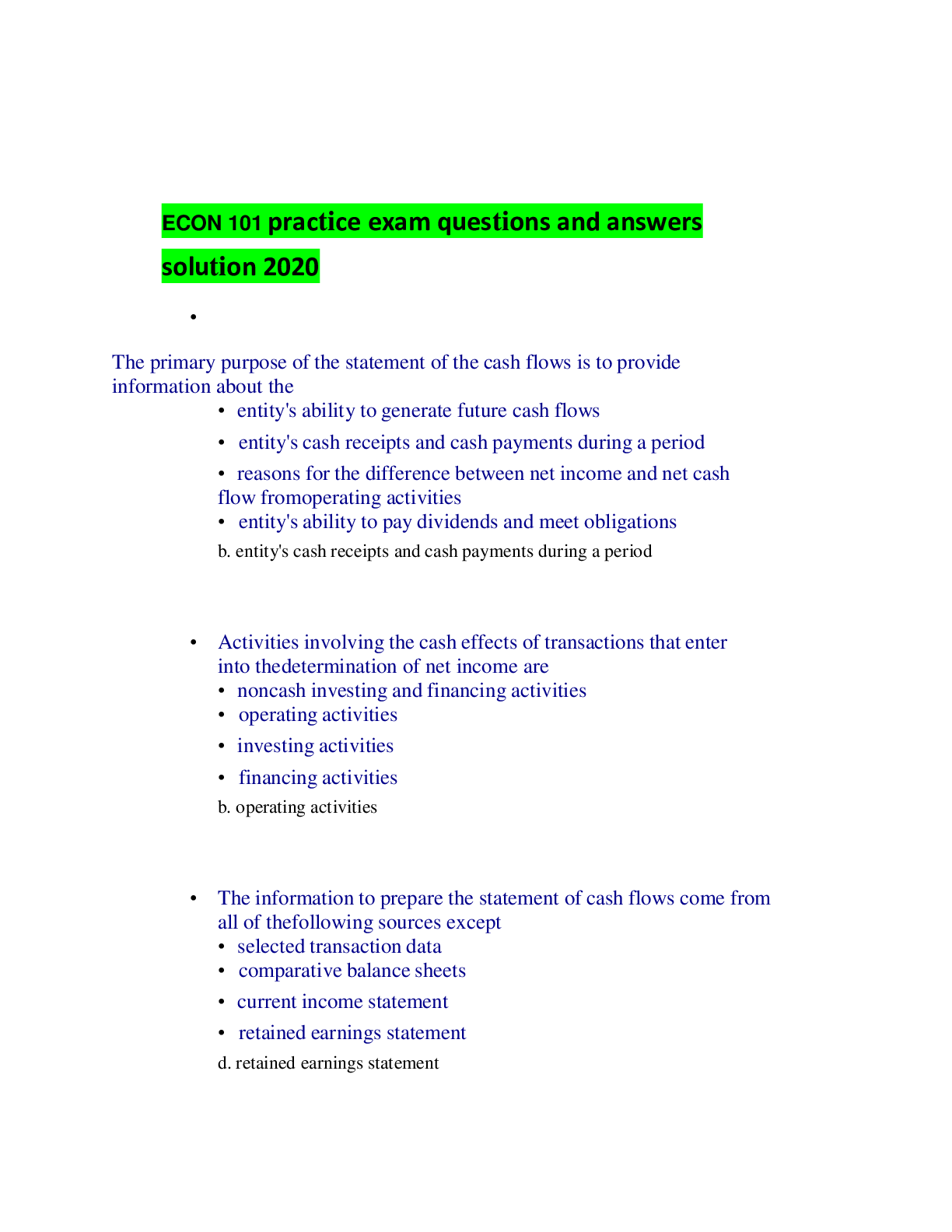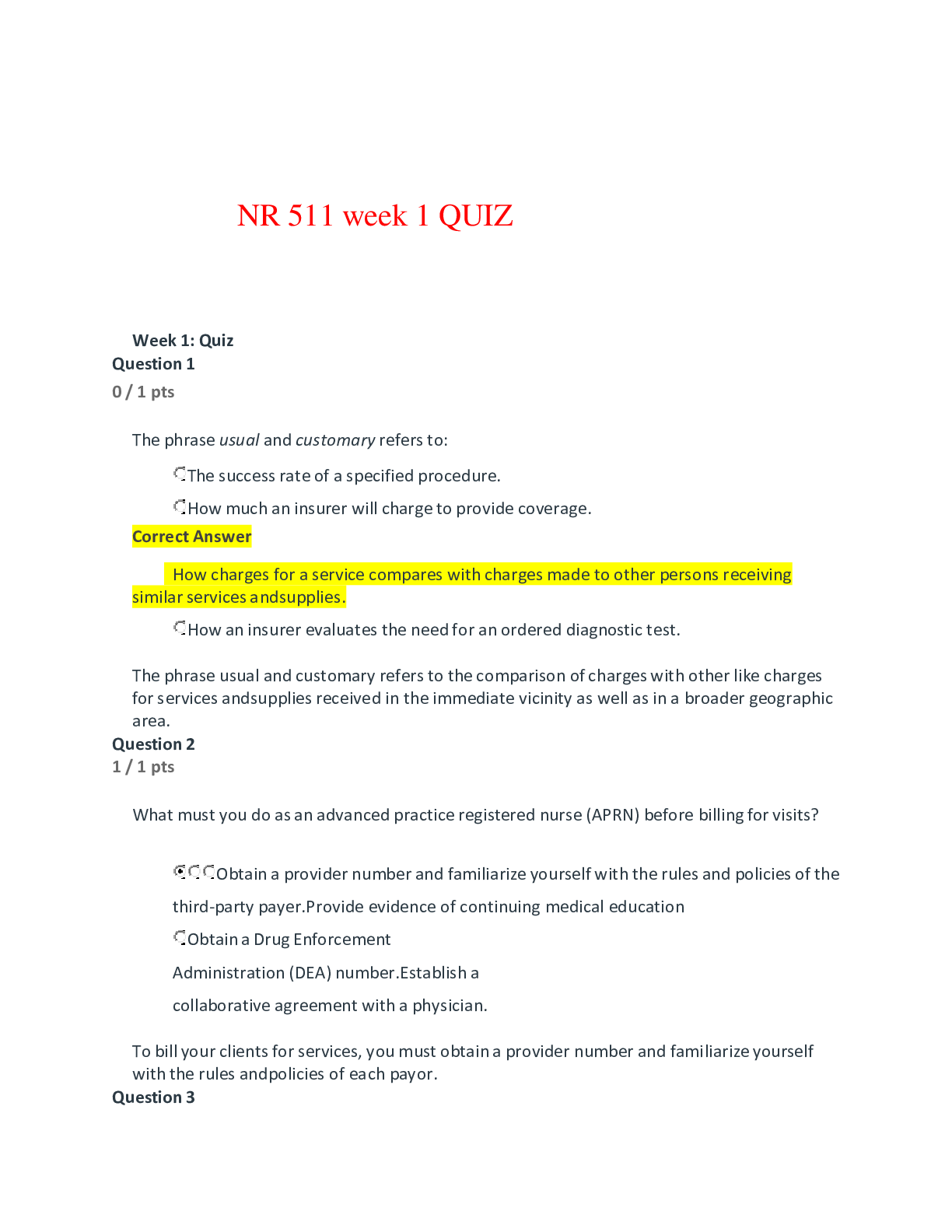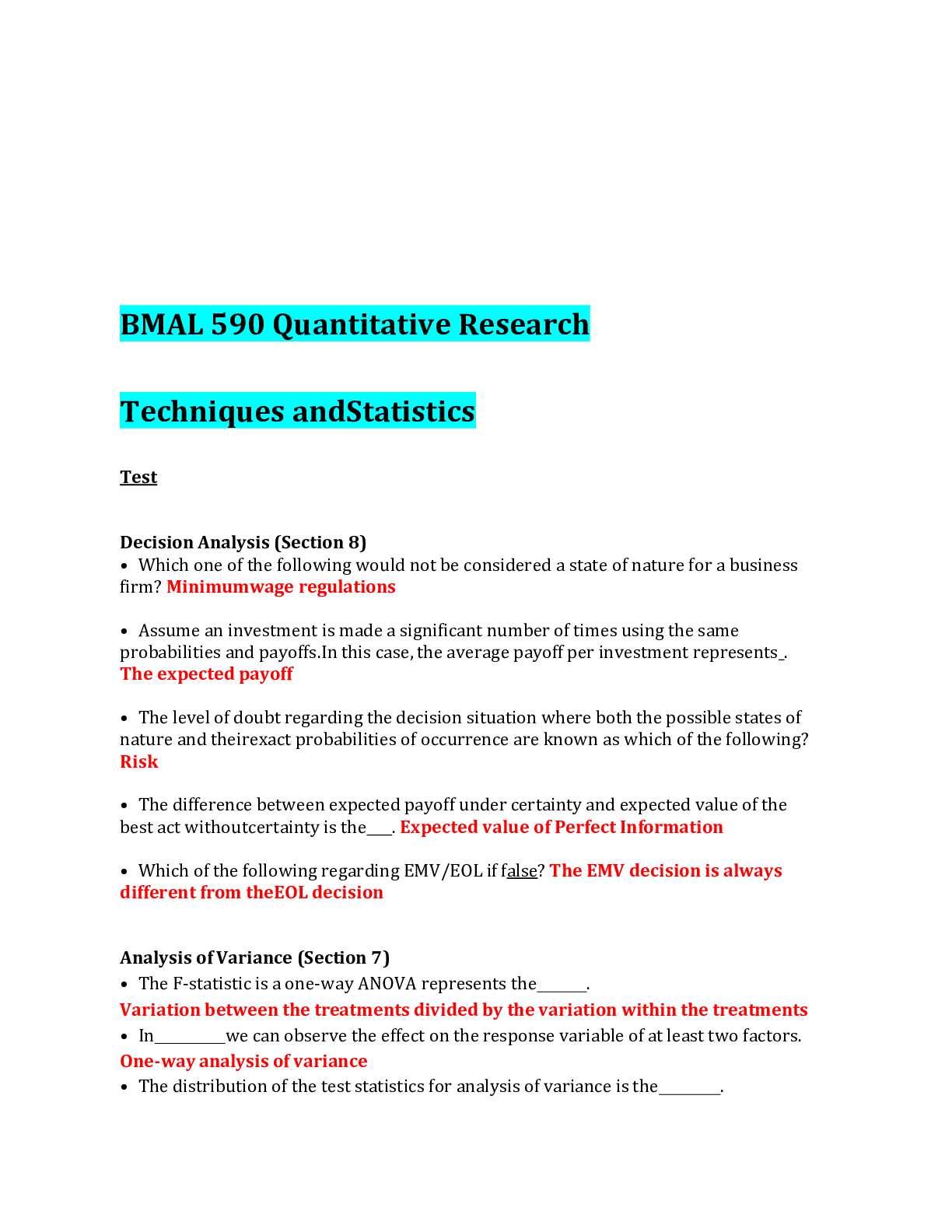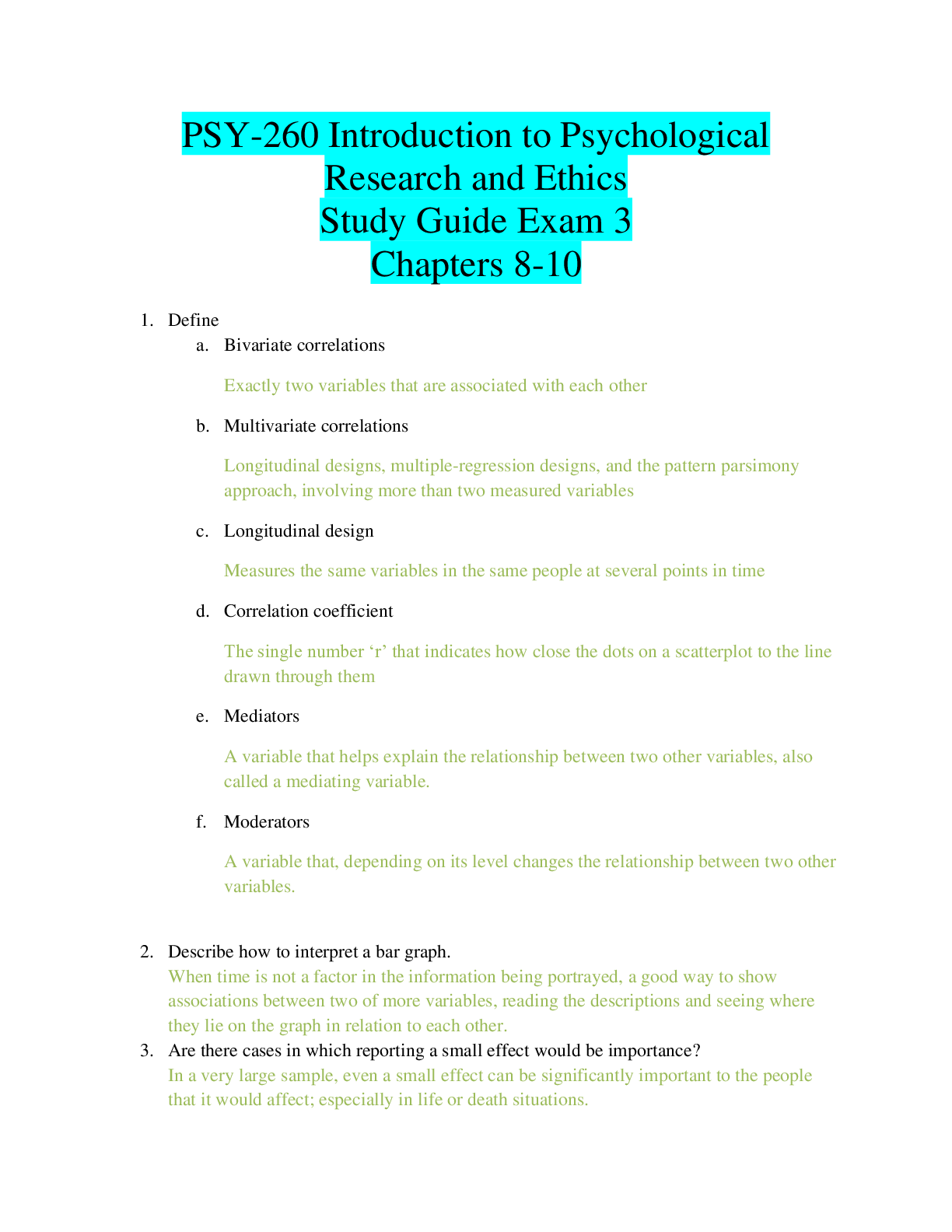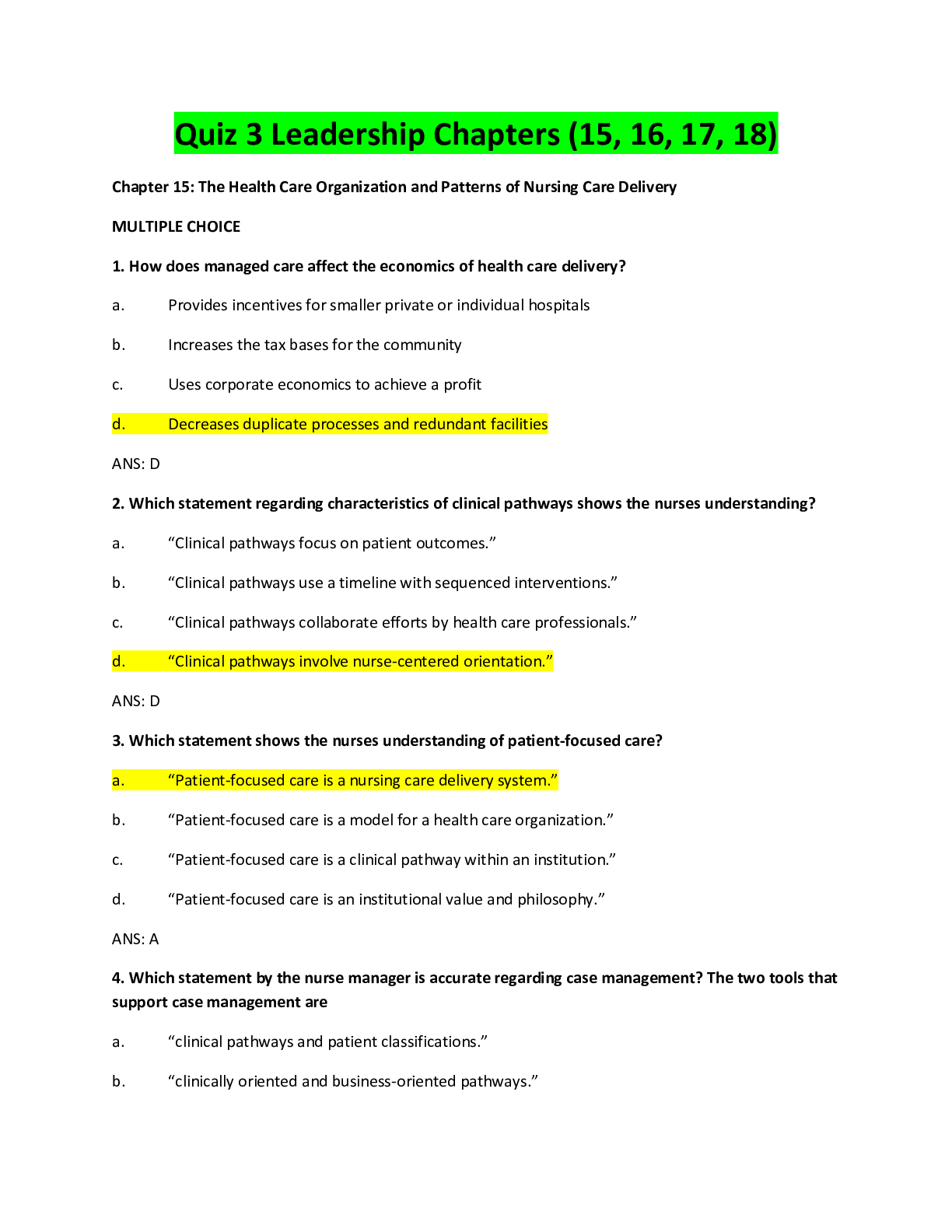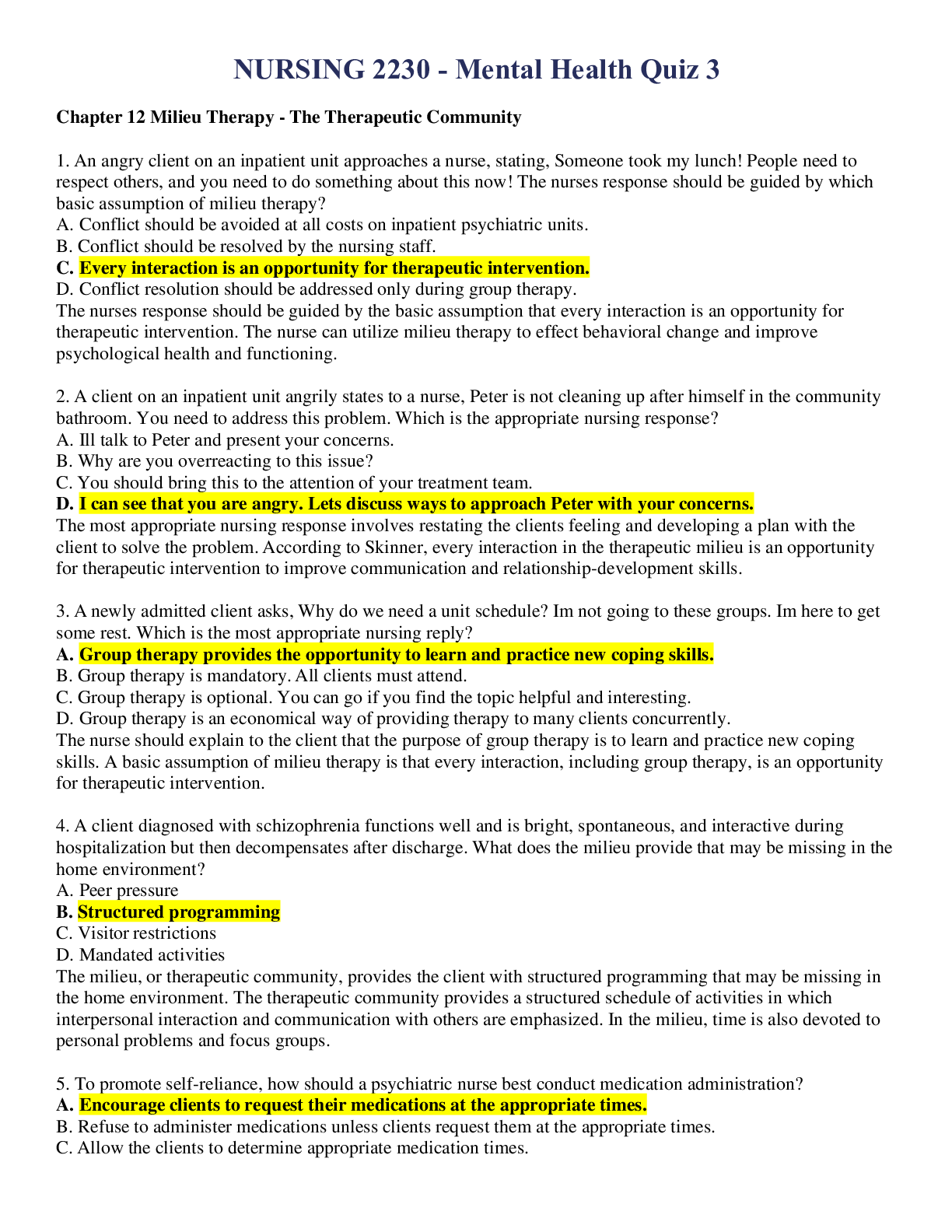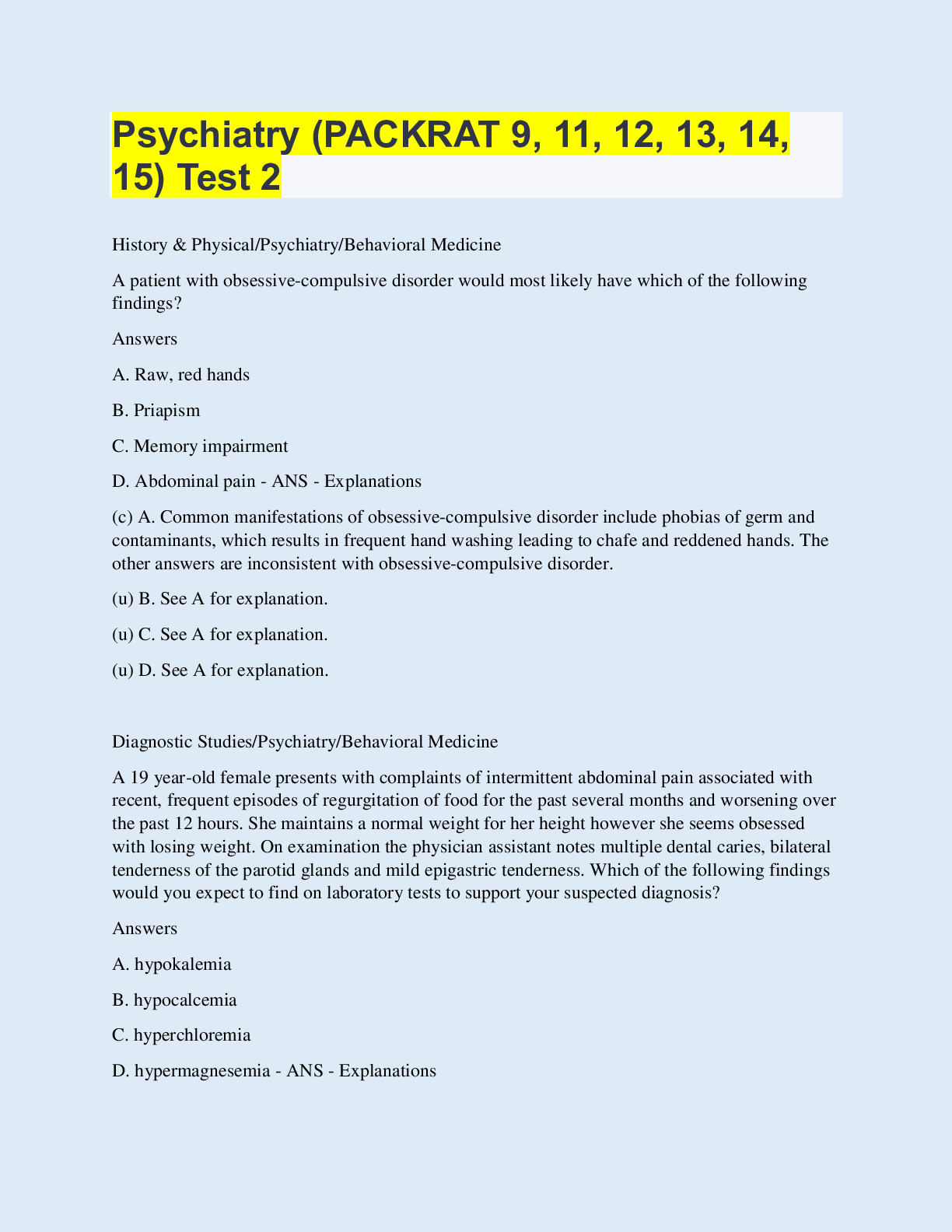*NURSING > QUESTIONS & ANSWERS > Mental Health Exam 3 Chapters 12, 13, 14, 15, 16, 17, 18, 19, 26 (All)
Mental Health Exam 3 Chapters 12, 13, 14, 15, 16, 17, 18, 19, 26
Document Content and Description Below
Chapter 12 Milieu Therapy - The Therapeutic Community 1. An angry client on an inpatient unit approaches a nurse, stating, Someone took my lunch! People need to respect others, and you need to do s... omething about this now! The nurses response should be guided by which basic assumption of milieu therapy? A. Conflict should be avoided at all costs on inpatient psychiatric units. B. Conflict should be resolved by the nursing staff. C. Every interaction is an opportunity for therapeutic intervention. D. Conflict resolution should be addressed only during group therapy. The nurses response should be guided by the basic assumption that every interaction is an opportunity for therapeutic intervention. The nurse can utilize milieu therapy to effect behavioral change and improve psychological health and functioning. 2. A client on an inpatient unit angrily states to a nurse, Peter is not cleaning up after himself in the community bathroom. You need to address this problem. Which is the appropriate nursing response? A. Ill talk to Peter and present your concerns. B. Why are you overreacting to this issue? C. You should bring this to the attention of your treatment team. D. I can see that you are angry. Lets discuss ways to approach Peter with your concerns. The most appropriate nursing response involves restating the clients feeling and developing a plan with the client to solve the problem. According to Skinner, every interaction in the therapeutic milieu is an opportunity for therapeutic intervention to improve communication and relationship-development skills. 3. A newly admitted client asks, Why do we need a unit schedule? Im not going to these groups. Im here to get some rest. Which is the most appropriate nursing reply? A. Group therapy provides the opportunity to learn and practice new coping skills. B. Group therapy is mandatory. All clients must attend. C. Group therapy is optional. You can go if you find the topic helpful and interesting. D. Group therapy is an economical way of providing therapy to many clients concurrently. The nurse should explain to the client that the purpose of group therapy is to learn and practice new coping skills. A basic assumption of milieu therapy is that every interaction, including group therapy, is an opportunity for therapeutic intervention. 4. A client diagnosed with schizophrenia functions well and is bright, spontaneous, and interactive during hospitalization but then decompensates after discharge. What does the milieu provide that may be missing in the home environment? A. Peer pressure B. Structured programming C. Visitor restrictions D. Mandated activities The milieu, or therapeutic community, provides the client with structured programming that may be missing in the home environment. The therapeutic community provides a structured schedule of activities in which interpersonal interaction and communication with others are emphasized. In the milieu, time is also devoted to personal problems and focus groups. 5. To promote self-reliance, how should a psychiatric nurse best conduct medication administration? A. Encourage clients to request their medications at the appropriate times. B. Refuse to administer medications unless clients request them at the appropriate times. C. Allow the clients to determine appropriate medication times. D. Take medications to the clients bedside at the appropriate times. The psychiatric nurse promoting self-reliance would encourage clients to request their medications at the appropriate times. Nurses are responsible for the management of medication administration on inpatient psychiatric units; however, nurses must work with clients to foster independence and provide experiences that would foster increased self-esteem. 6. A nurse working on an inpatient psychiatric unit is assigned to conduct a 45-minute education group. What should the nurse identify as an appropriate group topic? A. Dream analysis B. Creative cooking C. Paint by number D. Stress management The nurse should identify that teaching clients about stress management is an appropriate education group topic. Nurses should be able to perform the role of client teacher in the psychiatric area. Nurses need to be able to assess a clients learning readiness. Other topics for education groups include medical diagnoses, side effects of medications, and the importance of medication compliance. 7. What is the best rationale for including the clients family in therapy within the inpatient milieu? A. To structure a program of social and work-related activities B. To facilitate discharge from the hospital C. To provide a concrete demonstration of caring D. To encourage the family to model positive behaviors The nurse should include the clients family in therapy within the inpatient milieu to facilitate discharge from the hospital. Family members are invited to participate in some therapy groups and to share meals with the client in the communal dining room. Family involvement may also serve to prevent the client from becoming too dependent on the therapeutic environment. 8. How does a democratic form of self-government in the milieu contribute to client therapy? A. By setting punishments for clients who violate the community rules B. By dealing with inappropriate behaviors as they occur C. By setting community expectations wherein all clients are treated on an equal basis D. By interacting with professional staff members to learn about therapeutic interventions A democratic form of self-government in the milieu contributes to client therapy by setting the expectation that all clients should be treated on an equal basis. Clients participate in the decision-making and problem-solving aspects that affect treatment setting. The norms, rules, and behavioral limits are established by the staff and clients. All individuals have input. 9. A client has undergone psychological testing. With which member of the interdisciplinary team should a nurse collaborate to review these results? A. The psychiatrist B. The psychiatric social worker C. The clinical psychologist D. The clinical nurse specialist The nurse should consult with the clinical psychologist to review psychological testing results for the client. Clinical psychologists can administer, interpret, and evaluate psychological tests to assist in the diagnostic process. 10. In the role of milieu manager, which activity should the nurse prioritize? A. Setting the schedule for the daily unit activities B. Evaluating clients for medication effectiveness C. Conducting therapeutic group sessions D. Searching newly admitted clients for hazardous objects The milieu manager should search newly admitted clients for hazardous objects. Safety of the client and others is the priority. Nurses are responsible for ensuring that the clients safety and physiological needs are met within the milieu. 11. A nurse attends an interdisciplinary team meeting on an inpatient unit. Which of the following individuals are typically included as members of the interdisciplinary treatment team in psychiatry? Select all that apply. A. Respiratory therapist B. Occupational therapist C. Recreational therapist D. Social worker E. Mental health technician The typical interdisciplinary treatment team in a psychiatric inpatient setting consists of a psychiatrist, psychiatric nurse, psychiatric social worker, music therapist, dietician, psychologist, occupational therapist, recreational therapist, art therapist, mental health technician, and chaplain. Other disciplines may be included on the basis of resources available in a particular hospital setting and individual patient needs. 12. Which of the following are accurate descriptors of a therapeutic community? Select all that apply. A. The unit schedule includes unlimited free time for personal reflection. B. Unit responsibilities are assigned according to client capabilities. C. A flexible schedule is determined by client needs. D. The individual is the sole focus of therapy. E. A democratic form of government exists. In a therapeutic community the unit responsibilities are assigned according to client capability, and a democratic form of government exists. Therapeutic communities are structured and provide therapeutic interventions that focus on communication and relationship-development skills. Chapter 13 Crisis Intervention 1. A mother is concerned about her ability to perform in her new role. She is quite anxious and refuses to leave the postpartum unit. To offer effective client care, a nurse should recognize which information about this type of crisis? A. This type of crisis is precipitated by unexpected external stressors. B. This type of crisis is precipitated by preexisting psychopathology. C. This type of crisis is precipitated by an acute response to an external situational stressor. D. This type of crisis is precipitated by normal life-cycle transitions that overwhelm the client. The nurse should understand that this type of crisis is precipitated by normal life-cycle transitions that overwhelm the client. Reassurance and guidance should be provided as needed, and the client should be referred to services that can provide assistance. 2. A wife brings her husband to an emergency department after an attempt to hang himself. He is a full-time student and works 8 hours at night to support his family. He states, I cant function any longer under all this stress. Which type of crisis is the client experiencing? A. Maturational/developmental crisis B. Psychiatric emergency crisis C. Anticipated life transition crisis D. Traumatic stress crisis The nurse should determine that the client is experiencing a psychiatric emergency crisis. Psychiatric emergencies occur when crisis situations result in severe impairment, incompetence, or inability to assume personal responsibility. 3. A client comes to a psychiatric clinic, experiencing sudden extreme fatigue and decreased sleep and appetite. The client works 12 hours a day and rates anxiety as 8/10 on a numeric scale. What correctly written long-term outcome is realistic in addressing this clients crisis? A. The client will change his or her type A personality traits to more adaptive ones by week 1. B. The client will list five positive self-attributes. C. The client will examine how childhood events led to an overachieving orientation. D. The client will return to previous adaptive levels of functioning by week 6. The nurse should identify that a realistic long-term outcome for this client would be to return to previous adaptive levels of functioning. The nurse should work with the client to develop attainable outcomes that reflect the immediacy of the situation. To be correctly written, an outcome must be client-centered, specific, measurable, realistic, and contain a time frame. 4. A high school student has learned that she cannot graduate. Her boyfriend will be attending a college out of state that she planned to also attend. She is admitted to a psychiatric unit after overdosing on Tylenol. Which is the correctly written priority nursing diagnosis for this client? A. Ineffective coping R/T situational crisis AEB powerlessness B. Anxiety R/T fear of failure C. Risk for self-directed violence R/T hopelessness D. Risk for low self-esteem R/T loss events AEB suicidal ideations The priority nursing diagnosis for this client is Risk for self-directed violence R/T hopelessness. Nurses should prioritize diagnoses and outcomes on the basis of potential safety risk to the client and/or others. Nursing diagnoses should be correctly written to include evidence if actual and no evidence if the diagnosis is determined to be potential. 5. After threatening to jump off a bridge, a client is brought to an emergency department by police. To assess for suicide potential, which question should a nurse ask first? A. Are you currently thinking about harming yourself? B. Why do you want to harm yourself? C. Have you thought about the consequences of your actions? D. Who is your emergency contact person? The nurse should first assess the client for current suicidal thoughts to minimize risk of harm and provide appropriate interventions. A suicidal client is experiencing a psychiatric emergency. The crisis team should prioritize safety by assessing the client for thoughts of self-harm. 6. An involuntarily committed client, when offered a dinner tray, pushes it off the bedside table onto the floor. Which intervention should a nurse prioritize to address this behavior? A. Initiate forced medication protocol. B. Help the client to explore the source of anger. C. Ignore the act to avoid reinforcing the behavior. D. With staff support and a show of solidarity, set firm limits on the behavior. The most appropriate nursing intervention is to set firm limits on the behavior. Pushing food onto the floor does not warrant forced medication because the behavior is not a direct safety concern. Exploring the source of anger may be appropriate after the client has gained emotional control. Ignoring the act may further upset the client and does not reinforce appropriate behavior. 7. A college student who was nearly raped while jogging completes a series of appointments with a rape crisis nurse. At the final session, which client statement most clearly suggests that the goals of crisis intervention have been met? A. Youve really been helpful. Can I count on you for continued support? B. I dont work out anymore. C. Im really glad I didnt go home. It would have been hard to come back. D. I carry mace when I jog. It makes me feel safe and secure. The nurse should evaluate that the client who has developed adaptive coping strategies has achieved the goals of crisis intervention. 8. A despondent client, who has recently lost her husband of 30 years, tearfully states, Ill feel a lot better if I sell my house and move away. Which nursing reply is most appropriate? A. Im confident you know whats best for you. B. This may not be the best time for you to make such an important decision. C. Your children will be terribly disappointed. D. Tell me why you want to make this change. During crisis intervention, the nurse should guide the client through a problem-solving process. The nurse should help the individual confront the source of the problem, encourage the individual to discuss changes he or she would like to make, and encourage exploration of feelings about aspects of the crisis that cannot be changed. The nurse should also assist the client in determining whether any changes are realistic and if timing of change is appropriate. This response encourages the client to think through what may be an impulsive decision. 9. An inpatient client with a known history of violence suddenly begins to pace. Which client behavior should alert a nurse to escalating anger and aggression? A. The client requests prn medications. B. The client has a tense facial expression and body language. C. The client refuses to eat lunch. D. The client sits in group therapy with back to peers. The nurse should assess that tense facial expressions and body language may indicate that a clients anger is escalating. The nurse should conduct a thorough assessment of the clients past and current violent behaviors and develop interventions for de-escalation. 10. What is the best nursing rationale for holding a debriefing session with clients and staff after clients have witnessed a peer being taken down after a violent outburst? A. To reinforce unit rules with the client population B. To create protocols for the future release of tensions associated with anger C. To process feelings and concerns related to the witnessed intervention D. To discuss the client problems that led to inappropriate expressions of anger The nurse should determine that the purpose for holding a debriefing session with clients and staff after clients have witnessed a peer being taken down after a violent outburst is to process feelings and concerns related to the witnessed intervention. 11. Which of the following nursing statements and/or questions represent appropriate communication to assess an individual in crisis? Select all that apply. A. Tell me what happened. B. What coping methods have you used, and did they work? C. Describe to me what your life was like before this happened. D. Lets focus on the current problem. E. Ill assist you in selecting functional coping strategies. In the assessment phase, the nurse should gather information regarding the precipitating stressor and the resulting crisis. Focusing on the current problem and selecting functional coping strategies are nursing interventions rather than assessments. 12. Which of the following are effective interventions that a nurse should utilize when caring for an inpatient client who expresses anger inappropriately? Select all that apply. A. Maintain a calm demeanor. B. Clearly delineate the consequences of the behavior. C. Use therapeutic touch to convey empathy. D. Set limits on the behavior. E. Teach the client to avoid I statements related to expression of feelings. The nurse should determine that when working with an inpatient client who expresses anger inappropriately, it is important to maintain a calm demeanor, clearly define the consequences, and set limits on the behavior. The use of therapeutic touch may not be appropriate and could escalate the clients anger. Chapter 14 Assertiveness Training 1. During a psychoeducational group on assertiveness training, a client asks, Why do we need to learn about this stuff? Which is the most appropriate nursing reply? A. Because your doctor requires you to attend this group. B. Being assertive is the ability to stand up for yourself while respecting the rights of others. C. Assertiveness training teaches you how to ask for what you want, when you want it. D. Assertive people place the needs and rights of others before their own. Assertiveness training assists people to maintain their own self-respect and meet their needs while respecting the rights of others. 2. Two clients are roommates on an inpatient psychiatric unit. At breakfast, client A, who had been missing her gold locket, notices client B wearing it. Which should a nurse recognize as a nonassertive or passive behavioral response from client A? A. Client A ignores the situation. B. Client A discusses the situation with her nurse and develops a plan of action. C. Client A immediately approaches client B and pulls the necklace off her neck. D. Client A offers to wash client Bs clothes and accidentally spills bleach in the water. By ignoring the situation, client A avoids conflict, denies her feelings, and does not assertively resolve the problem. This is an example of nonassertive behavior. 3. A client on an inpatient unit is angry with a peer. During lunch, when the peer is not looking, the client spits into his soup. How would the nurse document this interaction? A. Client is displaying assertive behaviors. B. Client is displaying aggressive behaviors. C. Client is displaying passive behaviors. D. Client is displaying passiveaggressive behaviors. [Show More]
Last updated: 1 year ago
Preview 1 out of 39 pages
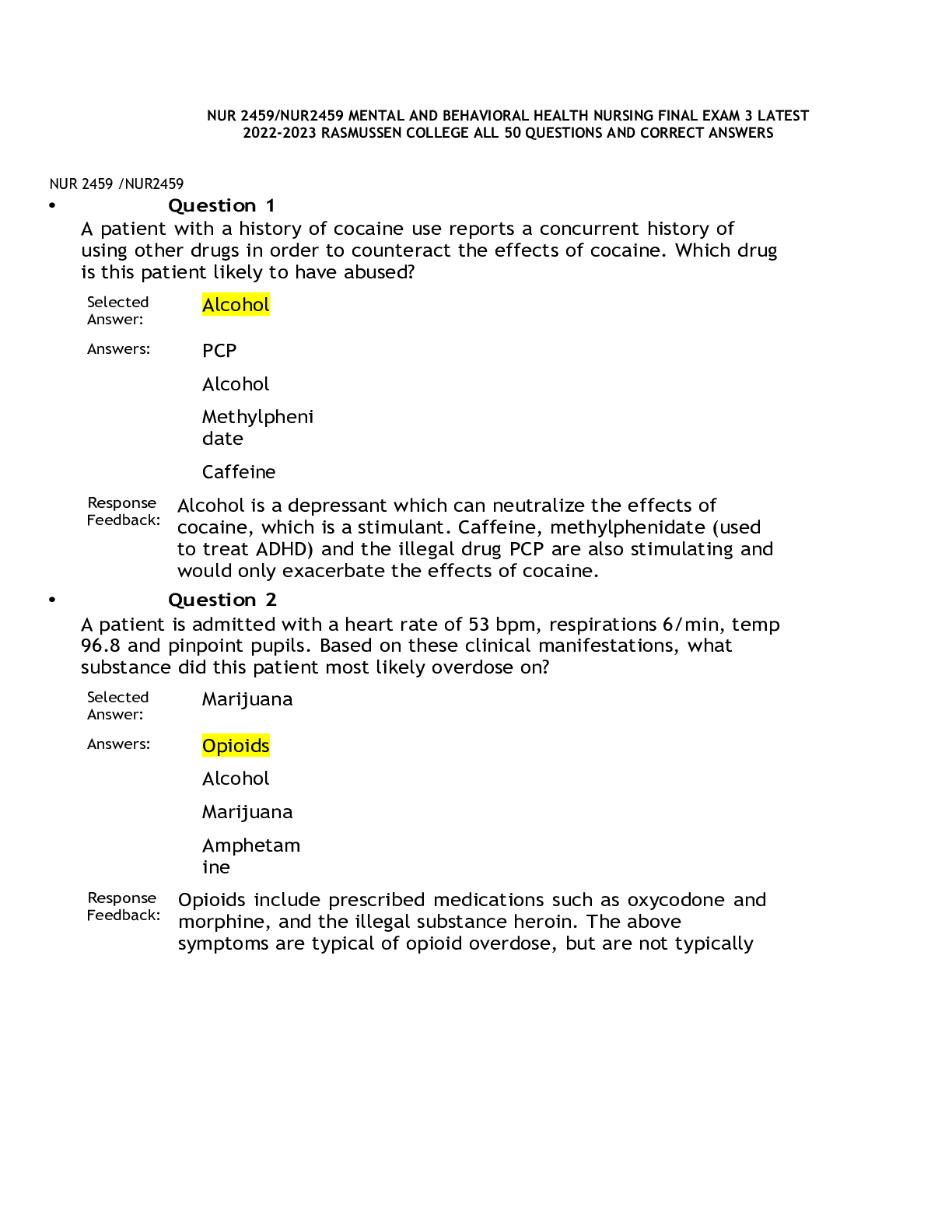
Buy this document to get the full access instantly
Instant Download Access after purchase
Add to cartInstant download
We Accept:

Reviews( 0 )
$14.00
Document information
Connected school, study & course
About the document
Uploaded On
Mar 23, 2021
Number of pages
39
Written in
Additional information
This document has been written for:
Uploaded
Mar 23, 2021
Downloads
0
Views
37

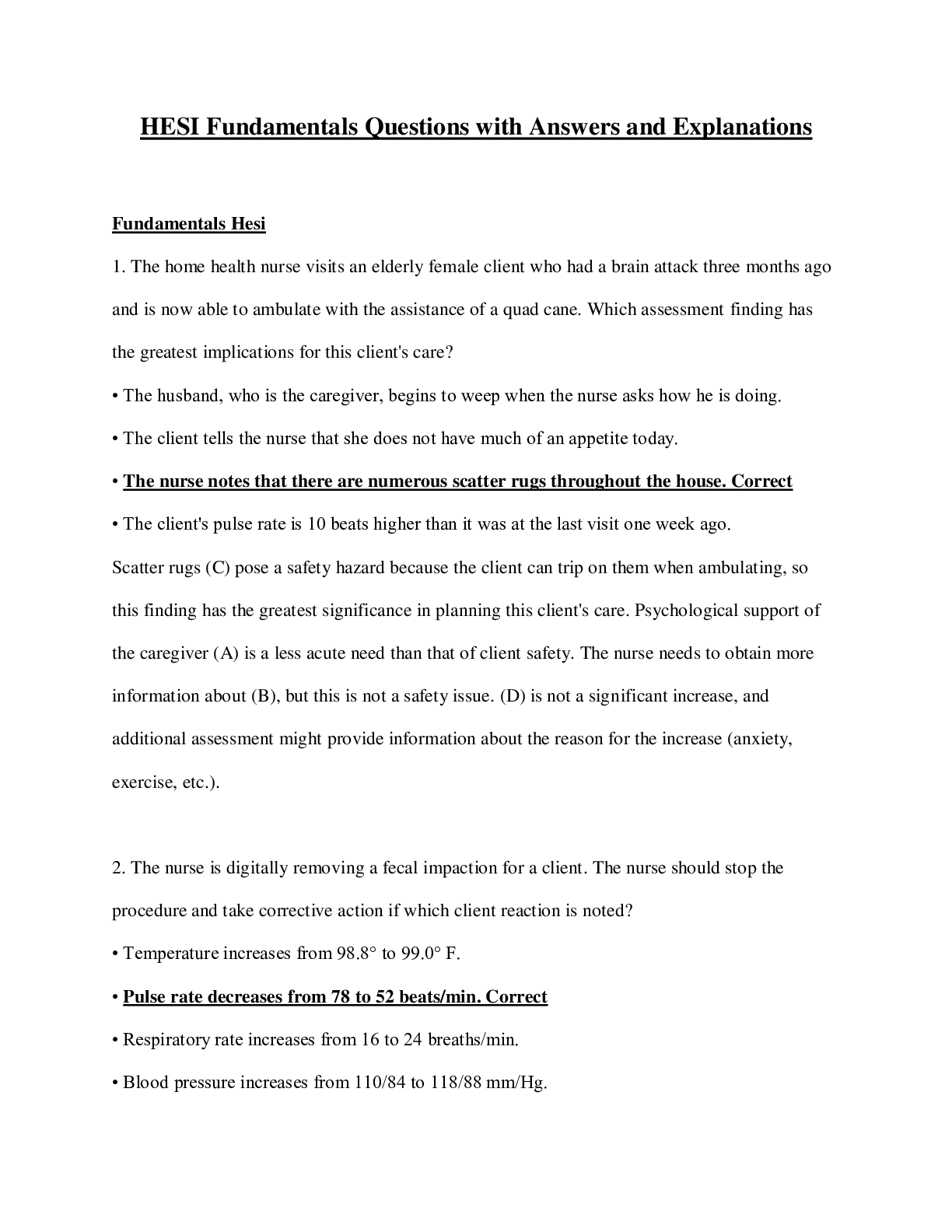
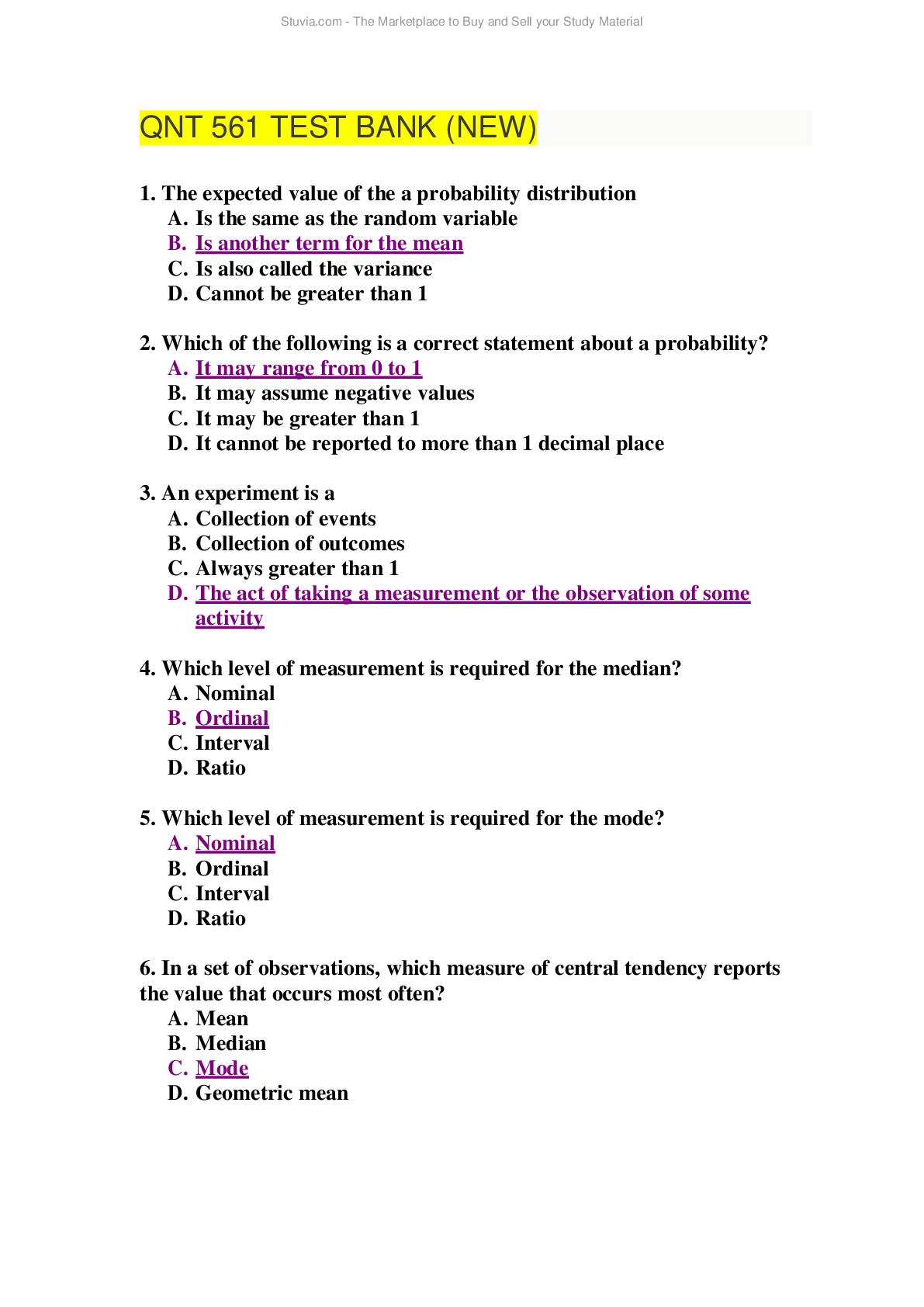



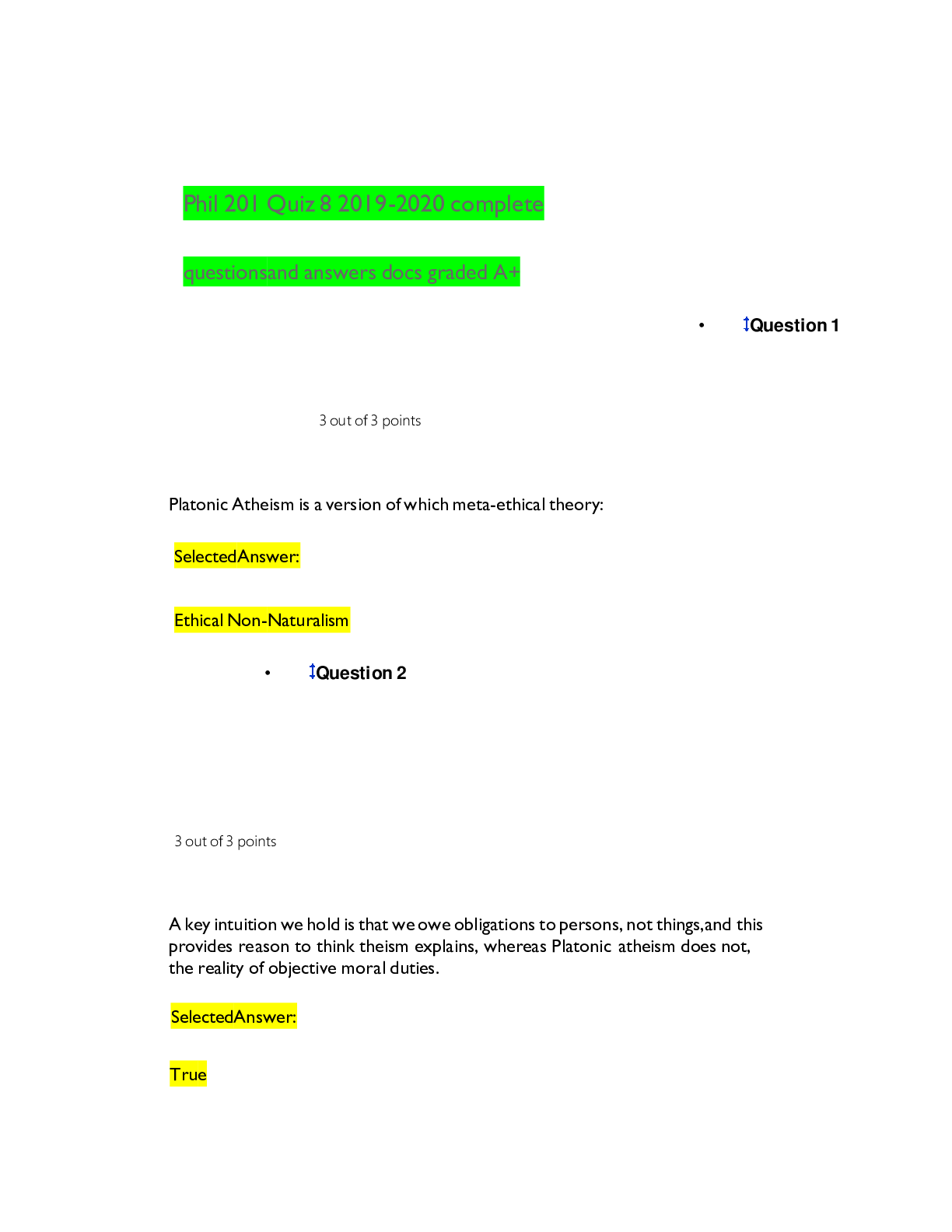
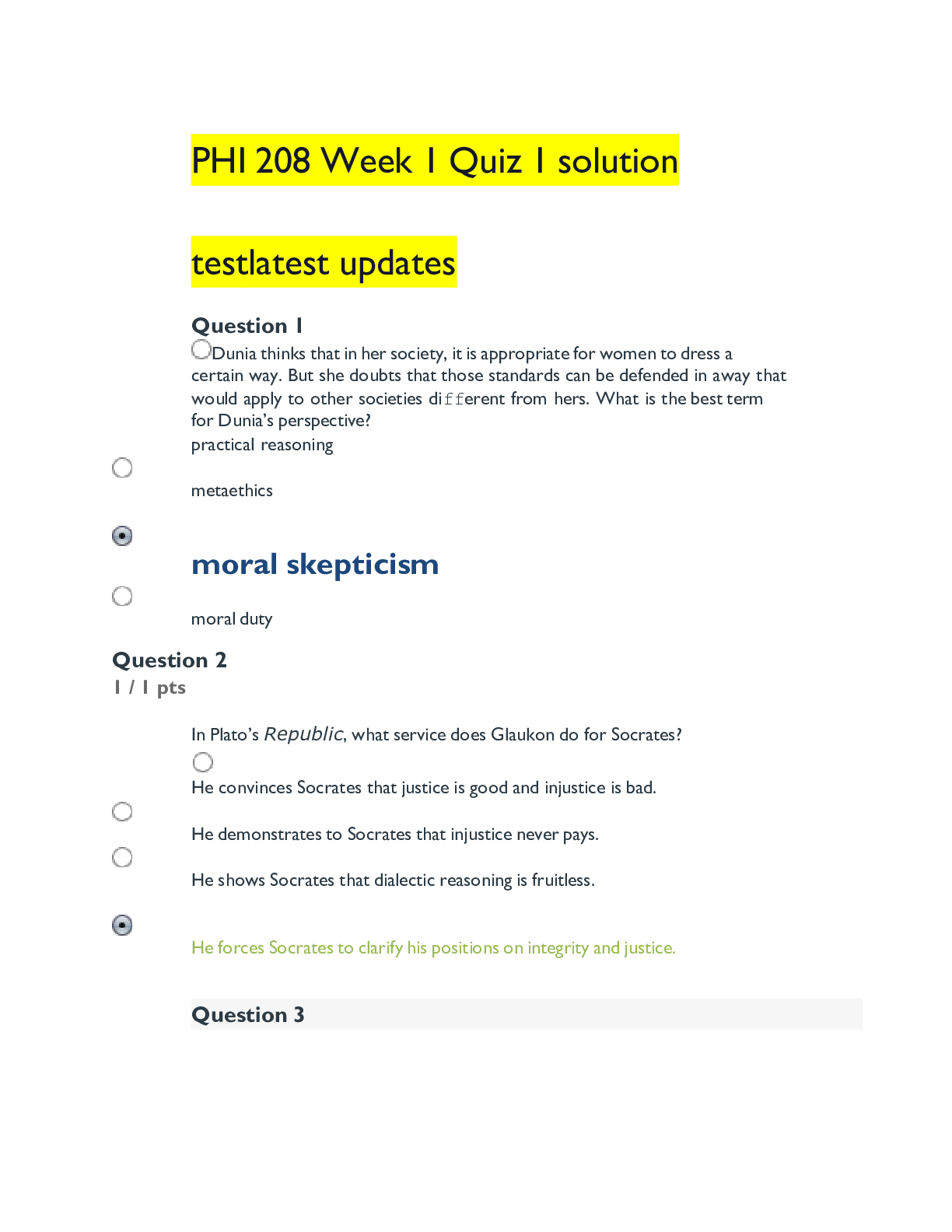
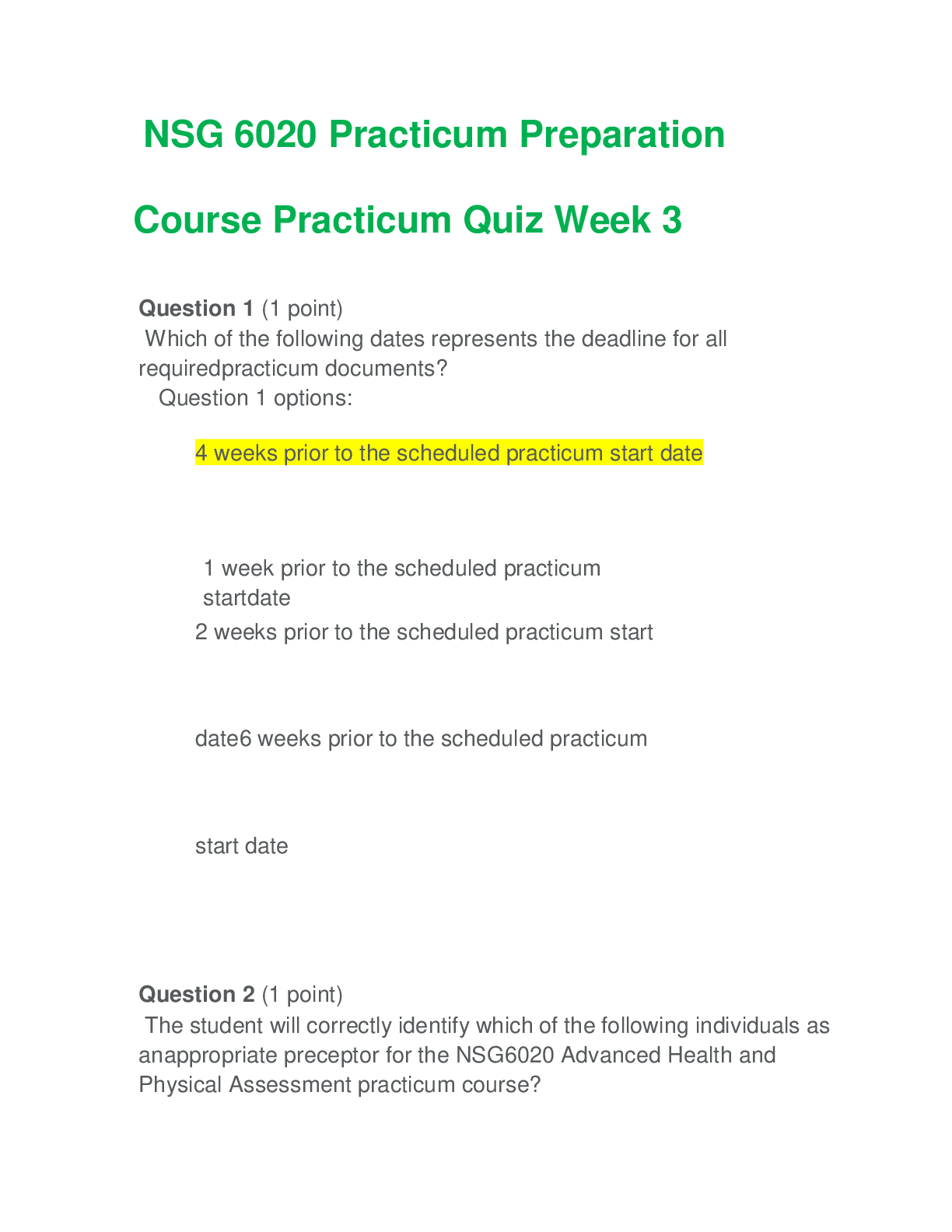
.png)
